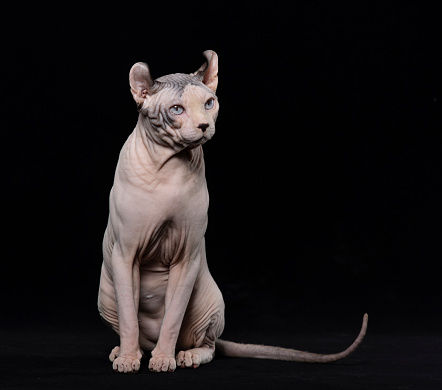Dwelf

History:
The Dwelf is a modern and experimental breed developed in the early 2000s in the United States through the intentional crossbreeding of three distinct breeds: the Sphynx, the American Curl, and the Munchkin. The name "Dwelf" is a blend of "dwarf" and "elf," referencing its short legs and curled ears. Breeders aimed to create a hairless, compact, and visually unique cat with a playful personality. Though still rare and not widely recognised by major registries like the CFA, the breed has a growing fan base and is accepted by some smaller associations. The Dwelf's combination of physical traits and outgoing temperament makes it a novelty among cat fanciers, but it also raises ethical debates regarding health and breeding practices.
Size: Small to medium-sized cat
Height: 12–18 cm
Weight: 2–4 kg
Life Expectancy: 12 to 15 years

Breed Appearance:
The Dwelf is a small, muscular cat with a low-slung, elongated body and short, sturdy legs inherited from its Munchkin ancestry. It is completely hairless or has a fine peach fuzz texture, with loose, wrinkled skin that feels warm and soft to the touch. The ears are large and curled backwards like those of the American Curl, giving the breed a distinctive, elfin expression. The face is rounded with prominent cheekbones, large expressive eyes, and a short, broad muzzle. The tail is whip-like and flexible. Skin colour varies widely, displaying all the usual feline coat patterns in pigmentation. Its unique mix of features gives the Dwelf an almost mythical appearance.
Health & Care:
Due to its mixed ancestry, the Dwelf may inherit health risks associated with all three parent breeds. Common concerns include skeletal and spinal issues like lordosis or pectus excavatum from the Munchkin line, cartilage and ear problems from the American Curl, and skin, heart, and dental issues seen in Sphynx cats. Regular vet checkups are essential to monitor for these conditions. The breed's hairless skin requires routine cleaning to prevent oil buildup, infections, or acne. Dwelf cats need a warm indoor environment, as they are vulnerable to both cold and sun exposure. With attentive care, many live long and active lives, though they may require more medical oversight than the average cat.

Living Conditions:
Dwelf cats are highly affectionate, people-oriented, and social. They thrive in indoor environments where they are part of the family routine and receive daily interaction. Their playful and curious nature means they enjoy interactive toys, climbing structures, and puzzle feeders. They get along well with children, other cats, and gentle dogs, making them great for multi-pet homes. However, they should be kept exclusively indoors due to their lack of fur and sensitivity to temperature changes. Dwelfs often follow their owners from room to room and like to snuggle in blankets, beds, or warm laps. A cosy, stimulating, and secure indoor space is ideal.
Grooming:
Despite being hairless, Dwelfs are not low-maintenance. Their skin produces natural oils that aren't absorbed by fur, leading to buildup that requires regular cleaning. Weekly sponge baths or gentle wiping with a damp cloth keep their skin healthy and free of grime. Their large, curled ears are prone to wax accumulation and should be cleaned regularly. Nail trimming, dental care, and eye cleaning are also important parts of their grooming routine. During cold months, they may need clothing or heated beds, while in warmer seasons, they should be protected from sunburn. With consistent care, their skin stays healthy and supple.

Advantages:
-
Dwelfs are affectionate, playful, and intelligent cats that form strong bonds with their families and love being involved in daily activities.
-
Their unique look—hairless, short-legged, and elf-eared—makes them a visually striking and conversation-starting pet for enthusiasts of rare breeds.
-
They are friendly and social, typically doing well with children, other cats, and cat-friendly dogs.
-
Their small size makes them suitable for apartments or homes with limited space.
-
Dwelfs are often described as dog-like in loyalty and personality, enjoying games, cuddles, and human attention.
Disadvantages:
-
Dwelfs are prone to several health concerns related to their mixed lineage, including joint, heart, and skin issues that may require ongoing veterinary care.
-
Their hairless bodies need frequent cleaning and special attention to avoid skin infections, oil buildup, or sunburn.
-
They are sensitive to temperature extremes and must be kept indoors in a warm, climate-controlled environment.
-
Due to their rarity and complex breeding, Dwelfs are expensive to purchase and may come from less-regulated breeding programs, requiring thorough research.
-
Their high need for social interaction can lead to separation anxiety if left alone for long periods.

